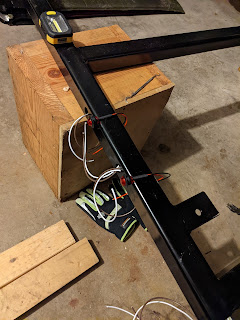Well, on one side anyway...
My focus for today was going to be getting the wheels on, and moving the trailer out from wall a little bit. And I got a good start on it this morning, packed the bearings, assembled the new hubs, and installed the left side wheel adapter. A couple of notes about Timbren suspensions.
1. Check the entire order as soon as you get it. My suspension was OK, but the boxes with the brakes were both damaged. One of the grease seals was damaged from banging around in the box in a baggie with the lug nuts and bearings.
2. The instructions recommend 50 lb/ft of torque on the backing plate. Not sure how since most of the bolts are partially/completely obscured. Had to fake that.
3. The main mounting bolts and spindle plate bolts require 105 lb/ft. This means a 1/2 torque wrench. Not everyone has that laying around, so be aware.
4. The instructions also say to seat the bearings with 200lb/ft of torque and back off. I'm not an expert, but my sense is that this is a really bad idea. My best guidance on wheel bearings is that you need only enough pressure to load the bearings and take the play out. e-trailer has a much more rational set of numbers, and you can probably find 50 YouTube videos on installing trailer bearings.
I hung the wheel and checked for interference. Uhh. Red flag.There's perhaps a 3/32¨ gap between the pivot bolt head and the tire. Looks like I goofed on the spacer dimension. Got an inch, need 1.5... That'll add a few day's delay in moving the trailer, but I can keep working on other projects - like the lights and brake wiring - while the wider adapters are on order. I think the extra spacing will be fine. If it was >2¨, I would drop back and order the long spindles instead.
With the suspension about as done as possible, I started working on the wiring, pulling wire through the entire perimeter, and connecting lights. I'll have another day of hooking up lights if today is any judge. Great plan going in, execution a little flawed. I'm glad I got the 200 count butt splices - I wound up re-doing several today. The lights draw around around 25mA each, so I won't plan to leave the running lights on when parked. Still, that's considerably less than the equivalent incandescent!!!
Pardon the messy garage. It's about 50 degrees in the garage (with the heater), and snow outside. My wife was nice enough to let me move her car out for the day, which adds a bit more room to work. The marker lights are push-in, while the tails are screw-in. The big learning for the day is that there is truly a huge difference between stranded copper, and copper clad aluminum wiring. i think the aluminum stuff is fine for the lights - it's inside, and won't move around but I'll run pure copper for the brake wiring.
A tip if you don't work with wiring very much:
You _can_ get away with stripping wire with a utility knife, and crimping with a pair of kitchen pliers, and I've certainly done so in an emergency. A step up is a crimping tool like sold in kits at the parts store. They work, but it's not great.
But if you have a lot of connections to make, and want clean strips, and clean crimps, get good tools. I have had my strippers (Klein 11063W) for at least 20 years. The blades are replaceable, and they make perfects strips every time.
The crimpers are new this job. My grip strength is not what it was years ago, so I opted for a new pair of Haisstronica insulated connector crimpers. They work very well. Also, having some sort of table to keep your tools handy, and that can follow you around the job is a big help. I should add a piece of cardboard just to keep things from falling through. (hasn't been an issue, but the next task involves a lot of screws, clamps and drill bits. I think I'll cut up a dog food box...


































